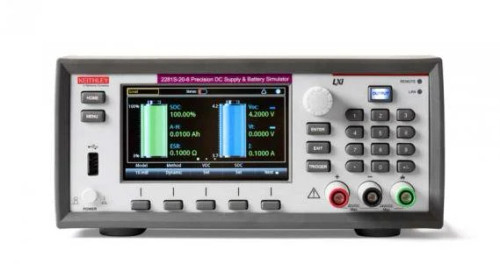Keithley 2308 Overview
The Keithley 2308 Portable Device Battery/Charger Simulator is optimized for use in testing mobile phones and other portable, battery-operated devices. When a device-under-test (DUT) transitions nearly instantaneously from a sleep or standby mode to the full power transmit state, the Keithley 2308’s rapid response to load changes means there’s little transient voltage drop from the programmed output voltage and the output recovers quickly. This fast response is particularly critical when testing portable devices with a pulsed mode of operation because it allows the device to perform properly while it’s being tested. In contrast, the slow-responding source voltage typical of conventional power supplies causes the DUT to perform improperly, leading to production yield problems and costly retesting.
The Keithley 2308 offers a complete solution for portable device sourcing and load current measurement. It has two independent power supply channels: one is optimized to simulate a battery; the second channel is optimized to perform like a charger for a rechargeable battery. The battery channel’s variable output resistance can be used to simulate the internal resistance of a battery so design and test engineers can simulate a battery’s output for testing devices under realistic operating conditions. This channel also sinks current to simulate a discharged battery. The charger channel can supply a voltage to test a portable device’s battery charge control circuitry, with the battery channel acting as the discharged battery load.
In addition to maintaining output voltage levels under difficult load conditions, the Keithley 2308 can measure a wide dynamic range of load current levels and can measure narrow current pulses (or pulses as narrow as 50μs). That makes it ideal for characterizing device power consumption by making low-level sleep mode measurements as well as pulsed operating load currents.
Keithley 2308 Battery Simulator Features
- Specialized dual-channel power supply for design and testing of portable, battery-operated devices
- Ultra-fast response to pulsed load operation
- Speed-optimized command set reduces test times
- Variable output resistance for simulating an actual battery’s output response
- Simulate a discharged battery and test charge control circuit performance with both a battery supply that can sink up to 3A and a charger supply
- Pulse peak, average, and baseline current measurements
- Integrating A/D converter for more precise measurements
- 100nA current measurement sensitivity
- Analog output for complete load current waveform characterization
- Catch production wiring problems immediately with open sense-lead detection
- Built-in digital voltmeter
- Four built-in digital control lines
Maximize production yield with fast response to load changes
Mobile phones, other portable devices (such as Bluetooth headsets, MP3 players, etc.), and RF components such as power amplifiers, power transistors, and transmitter modules experience large instantaneous load changes when they transition from a standby state to full power operation. For a mobile phone, the load current can change from a 100mA standby current to a 1A transmission current or a 10× (1000%) increase in the load current. The Keithley 2308 maintains a reliable, stable level of voltage output, even when the DUT produces large load current changes and/or has a pulsed operating mode.
The Keithley 2308’s fast recovery from load changes helps prevent the causes of false failures and destroyed devices in production test as well as field failure quality problems due to compromised components. The Keithley 2308 assures you of a stable, constant voltage source to maximize production yield and minimize production retest and rework costs.
Applications
- Design and test of a wide range of consumer electronics, including:
- – Mobile phones, mobile radios, cordless phones, and Bluetooth headsets
- – MP3 players, portable digital assistants (PDAs), digital cameras, GPS receivers, and notebook computers
- Design and test of electronic components such as RFIC power amplifiers, RF power transistors, and baseband and wireless chipsets for portable wireless devices






